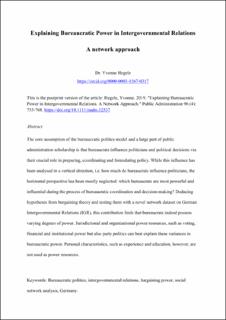Please use this identifier to cite or link to this item:
https://doi.org/10.21256/zhaw-5532Full metadata record
| DC Field | Value | Language |
|---|---|---|
| dc.contributor.author | Hegele, Yvonne | - |
| dc.date.accessioned | 2019-07-19T08:23:40Z | - |
| dc.date.available | 2019-07-19T08:23:40Z | - |
| dc.date.issued | 2018-08-20 | - |
| dc.identifier.issn | 0033-3298 | de_CH |
| dc.identifier.issn | 1467-9299 | de_CH |
| dc.identifier.uri | https://digitalcollection.zhaw.ch/handle/11475/17549 | - |
| dc.description | This is the peer reviewed version which has been published in final form at [https://doi.org/10.1111/padm.12537]. This article may be used for non-commercial purposes in accordance with Wiley Terms and Conditions for Use of Self-Archived Versions. | de_CH |
| dc.description.abstract | The core assumption of the bureaucratic politics model and a large part of public administration scholarship is that bureaucrats influence politicians and political decisions via their crucial role in preparing, coordinating and formulating policy. While this influence has been analysed in a vertical direction, that is, how much do bureaucrats influence politicians, the horizontal perspective has been mostly neglected: which bureaucrats are most powerful and influential during the process of bureaucratic coordination and decision-making? Deducing hypotheses from bargaining theory and testing them with a novel network dataset on German Intergovernmental Relations (IGR), this contribution finds that bureaucrats indeed possess varying degrees of power. Jurisdictional and organizational power resources, such as voting, financial and institutional power, and also party politics, can best explain these variances in bureaucratic power. Personal characteristics, such as experience and education, however, are not used as power resources. | de_CH |
| dc.language.iso | en | de_CH |
| dc.publisher | Wiley | de_CH |
| dc.relation.ispartof | Public Administration | de_CH |
| dc.rights | Licence according to publishing contract | de_CH |
| dc.subject.ddc | 320: Politik | de_CH |
| dc.title | Explaining bureaucratic power in intergovernmental relations : a network approach | de_CH |
| dc.type | Beitrag in wissenschaftlicher Zeitschrift | de_CH |
| dcterms.type | Text | de_CH |
| zhaw.departement | School of Management and Law | de_CH |
| dc.identifier.doi | 10.21256/zhaw-5532 | - |
| dc.identifier.doi | 10.1111/padm.12537 | de_CH |
| zhaw.funding.eu | No | de_CH |
| zhaw.issue | 4 | de_CH |
| zhaw.originated.zhaw | No | de_CH |
| zhaw.pages.end | 768 | de_CH |
| zhaw.pages.start | 753 | de_CH |
| zhaw.publication.status | acceptedVersion | de_CH |
| zhaw.volume | 96 | de_CH |
| zhaw.embargo.end | 2020-08-20 | de_CH |
| zhaw.publication.review | Peer review (Publikation) | de_CH |
| zhaw.webfeed | Kooperative Verwaltung | de_CH |
| zhaw.author.additional | No | de_CH |
| Appears in collections: | Publikationen School of Management and Law | |
Files in This Item:
| File | Description | Size | Format | |
|---|---|---|---|---|
| 2018_Hegele_Explaining_bureaucratic_power_in_intergovernmental_relations.pdf | Accepted Version | 342 kB | Adobe PDF |  View/Open |
Show simple item record
Hegele, Y. (2018). Explaining bureaucratic power in intergovernmental relations : a network approach. Public Administration, 96(4), 753–768. https://doi.org/10.21256/zhaw-5532
Hegele, Y. (2018) ‘Explaining bureaucratic power in intergovernmental relations : a network approach’, Public Administration, 96(4), pp. 753–768. Available at: https://doi.org/10.21256/zhaw-5532.
Y. Hegele, “Explaining bureaucratic power in intergovernmental relations : a network approach,” Public Administration, vol. 96, no. 4, pp. 753–768, Aug. 2018, doi: 10.21256/zhaw-5532.
HEGELE, Yvonne, 2018. Explaining bureaucratic power in intergovernmental relations : a network approach. Public Administration. 20 August 2018. Bd. 96, Nr. 4, S. 753–768. DOI 10.21256/zhaw-5532
Hegele, Yvonne. 2018. “Explaining Bureaucratic Power in Intergovernmental Relations : A Network Approach.” Public Administration 96 (4): 753–68. https://doi.org/10.21256/zhaw-5532.
Hegele, Yvonne. “Explaining Bureaucratic Power in Intergovernmental Relations : A Network Approach.” Public Administration, vol. 96, no. 4, Aug. 2018, pp. 753–68, https://doi.org/10.21256/zhaw-5532.
Items in DSpace are protected by copyright, with all rights reserved, unless otherwise indicated.